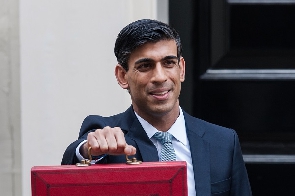The United Kingdom has slipped into recession just months ahead of a general election, official figures showed Thursday, derailing Prime Minister Rishi Sunak’s pledge to generate economic growth.
Gross domestic product fell 0.3% in the final three months of 2023, following a 0.1% contraction in the July-to-September period, the Office for National Statistics said. A recession is commonly defined as two consecutive quarters of contraction.
“All the main sectors fell on the quarter, with manufacturing, construction and wholesale being the biggest drags on growth, partially offset by increases in hotels and rentals of vehicles and machinery,” ONS director of economic statistics Liz McKeown said in a statement.
The ONS estimates that UK GDP increased by a meagre 0.1% in 2023. That’s the worst performance since 2009 when the economy was still reeling from the global financial crisis, if 2020, which was affected by the pandemic, is excluded. Last year’s weak rise in output follows growth of 4.3% in 2022.
“Across 2023 as a whole the economy has been broadly flat,” McKeown said.
The news will come as a disappointment to Sunak, whose ruling Conservative Party is contesting two local elections in England on Thursday. It could also widen the already commanding lead the opposition Labour Party enjoys in opinion polls ahead of the national election expected this year.
“Though the shallowness of this recession provides comfort, these figures also confirm that our economy remained locked in a cycle of persistent stagnation throughout 2023,” said Suren Thiru, economics director at the Institute of Chartered Accountants in England and Wales.
The data also provides an unwelcome backdrop for the government’s annual budget announcement next month. UK finance minister Jeremy Hunt is widely expected to unveil moderate cuts to some taxes, despite the anaemic economy and sky-high government debt levels.
Hunt said Thursday that low growth was to be expected due to high interest rates, which the Bank of England has taken to levels not seen in 26 years in order to tackle inflation.
“But there are signs the British economy is turning a corner… Although times are still tough for many families, we must stick to the plan — cutting taxes on work and business to build a stronger economy,” Hunt added in a statement.
Recession label ‘overly dramatic’
Notwithstanding the mild recession, the UK economy has fared much better than many economists feared a year ago, when several were predicting a considerably sharper downturn.
“It’s overly dramatic to label the decline in economic activity in the second half of 2023 a recession, given that employment continued to rise, real wages rebounded and measures of business and consumer confidence returned to levels consistent with rising activity by the end of the year,” said Samuel Tombs, chief UK economist at Pantheon Macroeconomics.
Slowing inflation and cuts to interest rates expected later this year could also boost economic activity, which is already picking up in the dominant services sector.
Annual UK inflation was unchanged in January at 4%. That’s still double the Bank of England’s 2% target but much lower than the record high of 11.1% hit in October 2022.
Food inflation fell to 7% from a recent high of 19.2% in March 2023, the ONS said Wednesday. Compared with the previous month, food prices posted their first decline in more than two years.
Meanwhile, salaries have now grown faster than prices for seven consecutive months. Average wages excluding bonuses grew at an annual rate of 6.2% in the three months to December, according to the ONS.
“We think this is the end of the UK recession, and growth will stagger into positive territory but only slowly,” economists at Nomura wrote in a note Thursday.
The view that the recovery will be uninspiring is supported by separate data from the ONS Thursday showing that growth in productivity, measured as output per hour, flatlined last year.
Business News of Thursday, 15 February 2024
Source: edition.cnn.com

















